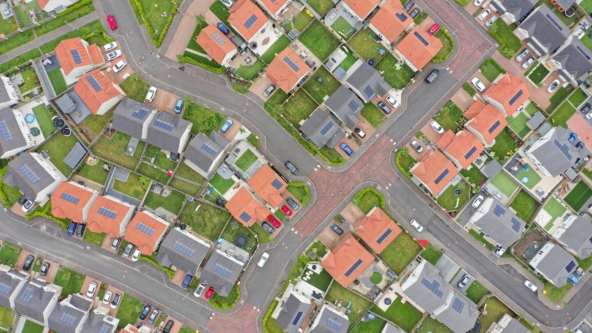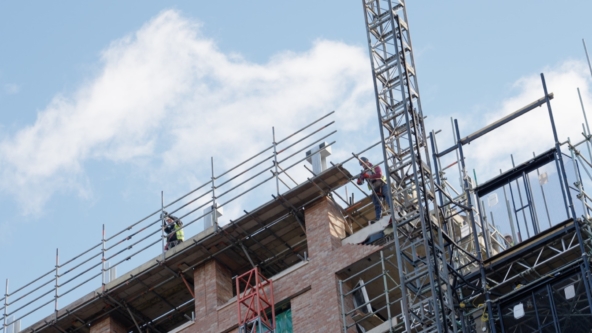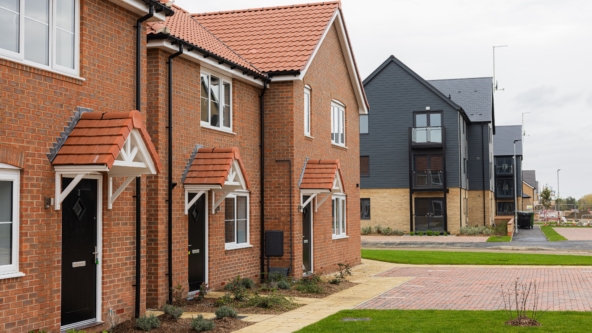In today’s environment, investors are looking for more than just attractive returns. They want opportunities that offer a positive social impact while also helping them fulfil environmental sustainability obligations.
At Octopus Capital, we’ve recognised the potential of the affordable housing sector to make good on each of these. The social impact of investment in affordable housing is obvious: the sector provides safe, secure housing for those who need it. The potential for positive environmental impact, however, is often overlooked.
Beyond the demand for new, energy efficient housing, housing associations (known as registered providers, or RPs) around the country are faced with the challenge of retrofitting existing properties – that is, modifying houses built at a time when energy efficiency wasn’t a concern to bring them up to line with today’s requirements. The costs are considerable, but private capital can help.
Timely investment in one area frees up capital for the other: by investing in the building of energy-efficient affordable housing, private investors release RP’s much-needed capital for the task of retrofitting existing homes. For investors, the right approach can offer threefold rewards: stable investments, meeting both social impact and environment objectives.
Our innovation in the space has demonstrated just how significant these rewards can be, for investors and for the eventual residents who come to call these efficient properties home. It offers a model for LGPS funds seeking to meet their environmental obligations and deliver meaningful environmental change.
Addressing the UK’s affordable housing problem
The UK is in the midst of an affordable housing crisis and, unfortunately, things are only forecast to get worse. According to research carried out on behalf of Octopus, three key barriers stand in the way of developing the homes needed to meet rising demand. These are construction costs, rising interest rates and the demands of an ageing housing stock, which require substantial investment if they’re going to meet decarbonisation targets.
Without investment, not enough existing properties will realise the energy efficiency standards required to meet net-zero targets set for 2050. Beyond the environmental implications, the efficiency shortcomings of these properties have direct, social implications for residents. The cost-of-living crisis is ongoing, and fuel poverty is at its heart.
We need to invest in development if they’re to meet the urgent demand for affordable housing. At the same time, major investment in existing housing stock is needed, both to meet the national target of Net Zero by 2050, and to alleviate the burden of fuel poverty for residents.
Jack Burnham, Head of Affordable Housing at Octopus Capital, explains: “The sector is under pressure to invest in existing homes, which, coupled with the cost of debt, limits our ability to build new homes. This is in addition to the sector’s challenge of being net zero by 2050.”
“We’re also seeing the effects of the cost-of-living crisis and high energy bills on people. The increased household costs are making housing affordability even more stretched, even for “affordable” homes.
“We think it’s important to invest in energy-efficient homes, not just for the environment, but so that homes are genuinely affordable for those living there.”
We know that private investors have a major role to play in making homes more affordable. Providing RPs with investment to fund the development of new, affordable and energy efficient housing allows them to allocate existing funds to retrofitting, bringing ageing properties in line with contemporary efficiency requirements and ensuring they remain, truly, affordable for residents.
What’s needed for success in the sector?
Beyond funding and building new developments, the challenge of retrofitting the country’s ageing housing stock for energy efficiency is daunting. From the installation of solar panels, air source heat pumps and insulation, to upgrading to double-glazing, to committing to the development of green space: it demands major investment.
Supporting the development of high-quality, energy-efficient, affordable housing is crucial to ensuring stakeholders have the capital they need to make these essential improvements. This offers institutional investors a compelling investment proposition with the potential for stable income, positive social and environmental impact, and effective climate risk management.
Jack speaks about the potential of private capital to create broader socio-environmental value:
“It seems crazy that in 2023 teachers and nurses had to choose between heating and eating, particularly when we know we’ve got the technology to provide properties with low energy bills.
We’re passionate about building homes with the lowest possible energy bills to ensure people don’t have to face that choice when they live in one of our homes.”
Working with the LGPS
We’ve seen the impact LGPS funds can make in addressing these challenges up-close, through our recent partnership with London CIV, which invested £50 million into our affordable housing strategy. This investment enabled us to begin construction of over 500 much-needed family and senior housing units around the country. Through further investments like this, our ambition is to fund the development of 5000 more high-quality, genuinely affordable homes in the coming years.
We know there are a number of locally interested investors who are looking for opportunities to deploy capital into funds that can provide specific social impact to their local areas. We think this is an approach that should be embraced and are pleased to be working with a number of locally interested investors to help support them deliver affordable homes in their areas, alongside the provision of affordable homes across the UK.
The challenges we’ve explored require further innovation to solve. Equity partnerships offer a model by which for-profit stakeholders can work alongside Housing Associations and Local Authorities to deliver affordable housing. Risks and rewards are shared, while private partners benefit from the fulfilment of environmental and social impact goals. Together, private and public stakeholders share a commitment to long-term stability and a vested interest in the well-being of the communities served.
Interested in affordable housing?
Talk to one of us.
If you are interested in investing into affordable housing, or other alternative investments, we would love to hear from you. Please fill out the form below and we will be in touch shortly to arrange a time for further discussion.



